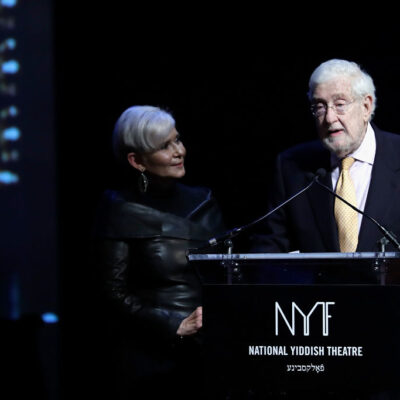LEGAL BATTLE
Former CFO sues Stephen S. Wise Temple, alleging retaliation over financial misconduct claims

Stephen Wise Temple
Stephen Wise Temple in Los Angeles.
The Stephen S. Wise Temple in Bel Air, Calif., is locked in a legal battle with its former chief financial officer, who is accusing the synagogue of wrongful termination for reporting on alleged financial improprieties by the congregation’s clergy. In its countersuit, the temple maintains that she was fired for cause and dismisses her allegations as unfounded.
Dana Rubin, who served as CFO from February 2023 until her termination on Jan. 31, 2025, filed her complaint in Los Angeles County Superior Court on June 4, claiming whistleblower status and alleging violations of the California Labor Code and wrongful termination in contravention of public policy. She seeks damages, attorneys’ fees and other costs.
In response to the lawsuit, SWT filed both a defense and a cross-complaint on July 25, calling Rubin’s allegations “baseless and without legal merit.” It is seeking over $100,000 in damages, including restitution, punitive damages and legal fees.
The synagogue’s response, which was filed by the Sansanowicz Law Group, asserts that Rubin did not engage in any legally protected whistleblower activity. The temple maintains she was an at-will employee terminated for legitimate business reasons, rejecting her whistleblower claims and arguing that she never raised her concerns according to the necessary procedures and with the relevant authorities within the synagogue to address them. According to the synagogue, Rubin instead shared “confidential, private and sensitive information of SWT’s financials and personal lives of clergy members in an inappropriate manner” with a subordinate employee from an unrelated department, in what Rubin described at the time as “hot gossip.” The temple noted that the employee in question spoke with the human resources department about the issue, believing Rubin had acted inappropriately.
Stephen S. Wise Temple, founded in 1964 and located in the Bel Air Hills, is one of the largest and most prominent Reform Jewish congregations in Southern California. It includes a synagogue, early childhood center, elementary day school and religious school.
According to her lawsuit, Rubin claims that she was fired in direct retaliation for raising those concerns about what she describes as fraudulent conduct by temple leadership, including Rabbi Joshua “Yoshi” Zweiback, the congregation’s senior rabbi; Rabbi Sari Laufer; and Emma Lutz, the senior cantor. Rubin alleges that these clergy members used temple funds for personal benefit in violation of both state law and internal policies. Her estimate of the suspect spending — based on the financial information she had access to — surpassed $30,000. This included the synagogue paying to fly Zweiback’s wife to Israel in first class, paying for Laufer’s daughter to fly with her to Israel and paying for a spa visit for Lutz, among other personal expenses.
In the case of the first-class tickets, in her lawsuit, Rubin provided the transcripts of her discussions about the matter with SWT’s executive director, Jodi Berman, in which Rubin questioned a reimbursement request for a first-class ticket to Israel for Rabbi Zweiback’s wife. When Rubin asked Berman about the matter, she responded, “Whoa. Just out of curiosity, what’s the amount on that?” To which Rubin answered, “$4,720, just under my threshold for approval… We really need a revision of our policies though, because if someone started digging into any of this, it could look not good.” To which Berman replied, in all capital letters: “AGREED.”
The temple, however, characterizes Rubin’s allegations as the result of misunderstanding the synagogue’s internal policies. In its cross-complaint, it states that Rubin’s “continued incompetence” led her to mischaracterize the legitimate discretionary funds used by clergy. The temple claims it investigated the concerns she raised and found them “largely unfounded,” prompting internal policy clarifications.
In one cited instance, Rubin refers to a June 2024 email exchange between Rabbi Zweiback and Rabbi Laufer regarding travel to Israel. Under the subject “Ethical and Practical Question,” Laufer asked if she could use discretionary funds to buy a ticket for her daughter, writing: “As you know, flights to Israel this summer are CRAZY. Right now, I do not have the budget for it… am I allowed to use [my DF] to buy [my daughter’s] ticket?”
Zweiback responded: “Since you are going to Israel to study at Hartman which will directly benefit the congregation and I’m assuming the only way you can do this is by bringing family with you, it seems reasonable to me. I have used DF funds in the past to bring family with me… it benefits the congregation.”
Rubin further claims she was pressured to sign a representation letter to outside auditors falsely stating she had no knowledge of fraud or suspected fraud and no side agreements related to related-party transactions. She refused, citing her belief that the temple had entered into a questionable agreement with Laufer in violation of federal law. This, she says, further motivated her dismissal.
The temple’s filing paints a markedly different picture of Rubin’s tenure, accusing her of gross misconduct and poor performance overall. Among its claims: she submitted financial forecasts that overstated surpluses by $600,000 and $1.8 million across two fiscal years; ignored follow-up from an auditing firm offering the temple a significant rebate; and improperly shared salary information in meetings. It also alleges Rubin illegally recorded conversations with colleagues and retained those recordings after her departure.
Additionally, the temple accuses Rubin of mishandling confidential information, claiming she downloaded and stored sensitive temple data on personal devices and cloud accounts; and that forensic analysis shows she continues to possess temple property, as well as information from prior employers.
Rubin, a Burbank resident who previously served as CFO of another L.A.-based nonprofit overseeing more than two dozen employees, contends that her actions were motivated solely by her fiduciary duty to protect the temple from potential IRS audits, penalties or the loss of its tax-exempt status.
The lawsuit also names 100 unnamed individuals and entities believed to have played a role in Rubin’s dismissal. These may include officers, managers or others in supervisory roles allegedly involved in decisions that led to her termination. The complaint holds them jointly and severally liable under California law.














